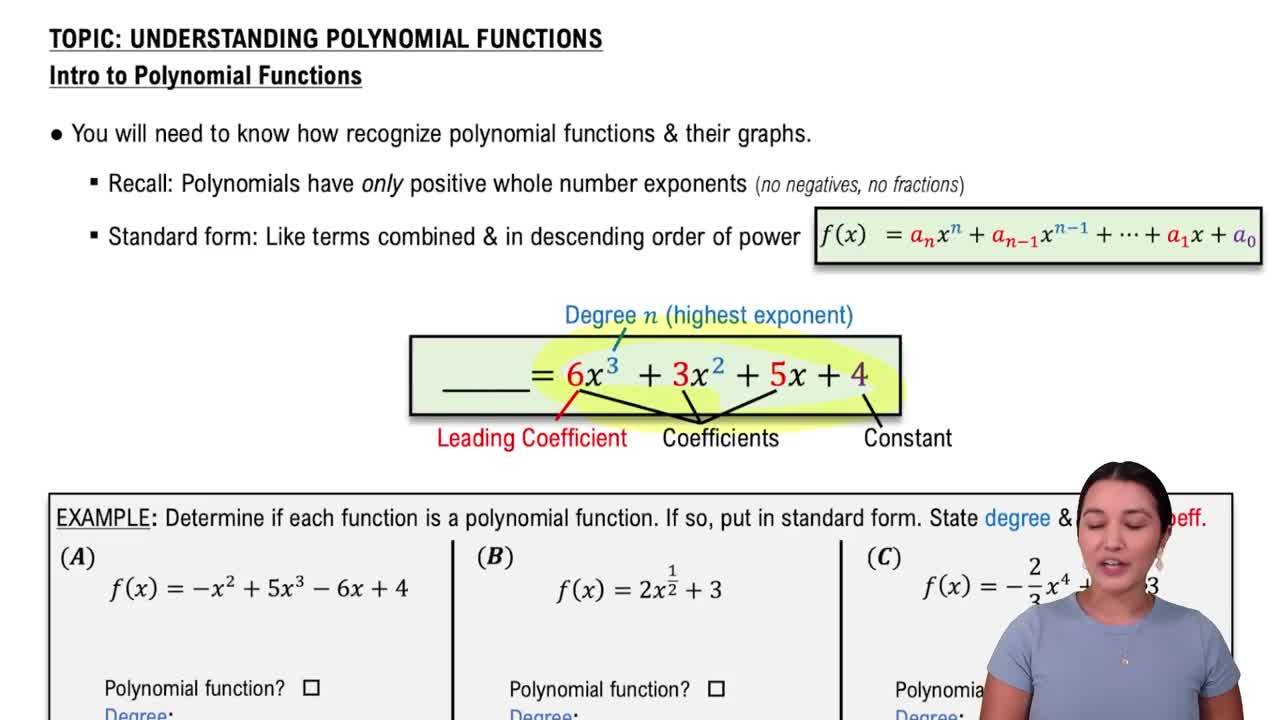Graph each polynomial function. Factor first if the polynomial is not in factored form. ƒ(x)=-x(x+1)(x-1)
Table of contents
- 0. Review of Algebra4h 18m
- 1. Equations & Inequalities3h 18m
- 2. Graphs of Equations1h 43m
- 3. Functions2h 17m
- 4. Polynomial Functions1h 44m
- 5. Rational Functions1h 23m
- 6. Exponential & Logarithmic Functions2h 28m
- 7. Systems of Equations & Matrices4h 5m
- 8. Conic Sections2h 23m
- 9. Sequences, Series, & Induction1h 22m
- 10. Combinatorics & Probability1h 45m
4. Polynomial Functions
Understanding Polynomial Functions
Problem 36
Textbook Question
In Exercises 33–40, use the Intermediate Value Theorem to show that each polynomial has a real zero between the given integers. f(x)=x4+6x3−18x2; between 2 and 3
 Verified step by step guidance
Verified step by step guidance1
First, recall the Intermediate Value Theorem (IVT), which states that if a function \( f(x) \) is continuous on a closed interval \([a, b]\) and \( f(a) \) and \( f(b) \) have opposite signs, then there exists at least one \( c \) in \((a, b)\) such that \( f(c) = 0 \).
Identify the function and the interval: \( f(x) = x^{4} + 6x^{3} - 18x^{2} \), and the interval is between \( 2 \) and \( 3 \).
Evaluate \( f(2) \) by substituting \( x = 2 \) into the function: \( f(2) = 2^{4} + 6(2)^{3} - 18(2)^{2} \).
Evaluate \( f(3) \) by substituting \( x = 3 \) into the function: \( f(3) = 3^{4} + 6(3)^{3} - 18(3)^{2} \).
Check the signs of \( f(2) \) and \( f(3) \). If one is positive and the other is negative, then by the IVT, there is at least one real zero of \( f(x) \) between 2 and 3.
 Verified video answer for a similar problem:
Verified video answer for a similar problem:This video solution was recommended by our tutors as helpful for the problem above
Video duration:
3mPlay a video:
Key Concepts
Here are the essential concepts you must grasp in order to answer the question correctly.
Intermediate Value Theorem
The Intermediate Value Theorem states that if a function is continuous on a closed interval [a, b] and takes values f(a) and f(b) at each end, then it must take any value between f(a) and f(b) at some point within the interval. This theorem is used to prove the existence of roots when the function changes sign.
Recommended video:

Introduction to Hyperbolas
Polynomial Continuity
Polynomials are continuous functions for all real numbers, meaning there are no breaks, jumps, or holes in their graphs. This continuity ensures that the Intermediate Value Theorem can be applied to polynomials on any interval, making it possible to locate zeros by checking sign changes.
Recommended video:

Introduction to Polynomial Functions
Evaluating Function Values at Given Points
To apply the Intermediate Value Theorem, you must calculate the polynomial's values at the endpoints of the interval. If the function values at these points have opposite signs, it indicates the function crosses the x-axis, confirming the existence of a real zero between those points.
Recommended video:

Evaluating Composed Functions

 6:04m
6:04mWatch next
Master Introduction to Polynomial Functions with a bite sized video explanation from Patrick
Start learningRelated Videos
Related Practice
Textbook Question
765
views
